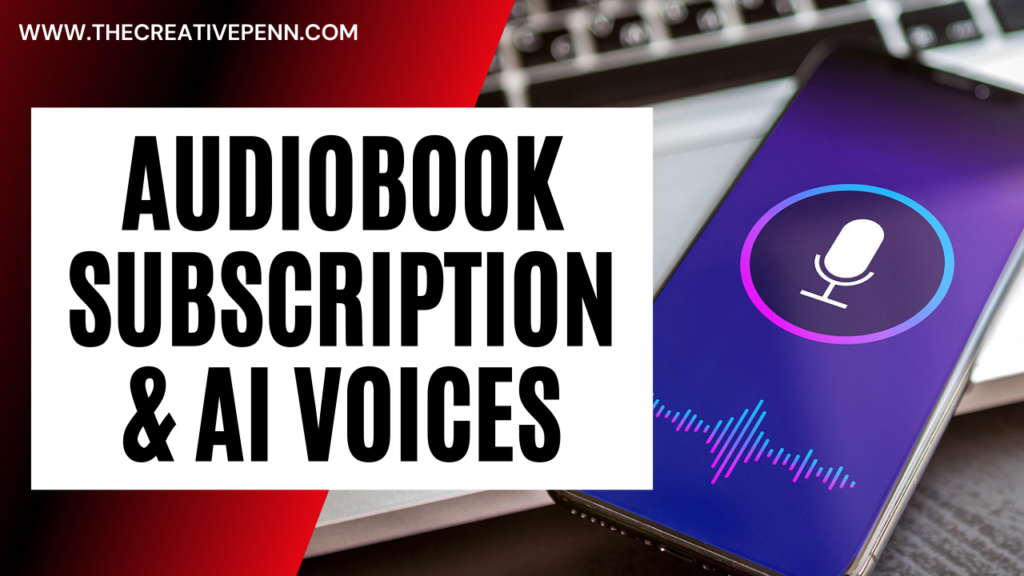The audiobook market is currently held back by availability and cost of titles, as well as preference for narrators with different voices. The subscription model and AI voice narration will solve these issues — but we need audio rights licensing reform to make it happen.
In this solo show:
- Streaming and subscription models
- AI voices will narrate mass-market audio content with human narrators producing artisan audio experiences
- Audio licensing will expand for different levels of listener experience
- Authors and publishers will sell directly from their own platforms to superfans who want to support creators
This is the second in my AI episodes based on my new book, Artificial Intelligence, Blockchain, and Virtual Worlds: The Impact of Converging Technologies On Authors and the Publishing Industry.
Check out previous episodes and resources on AI at www.TheCreativePenn.com/future
The written word is still the primary focus for authors and publishing, but in the last few years, there has been significant growth in audiobook revenue and the use of podcasting for book marketing. A Deloitte paper on audiobooks and podcasting, The Ears Have It, noted that, “at current growth rates, audiobook revenues are on a trajectory to pass e-books by 2023 or so”.
It’s an exciting time to be in audio, and there are some societal trends and technological shifts that will grow the market and expand possibilities even further.
Streaming and subscription models
“Possession is not as important as it once was. Accessing is more important than ever.”
Kevin Kelly, The Inevitable: Understanding the 12 Technological Forces That Will Shape Our Future
The subscription model for content is great value for consumers. They can watch unlimited movies and TV on Netflix and listen to unlimited music on Spotify, both of which are tailored to individual preferences. They can read on Kindle Unlimited, and there are many more examples of this kind of subscription. It is a mainstream business model and already an option for audio in many markets with Storytel, Scribd and others, even though it has yet to pervade the significant audiobook markets of the US and UK. It will only expand in the years to come.
Publishing has slowly followed the trajectory of the music industry in terms of digital transformation. TechCrunch reported in September 2020 that revenue for recorded music has increased during 2020 owing to the growth in streaming under the pandemic. Paid subscriptions like Spotify and Apple Music are up 24% year-on-year, and “streaming now makes up 85% of all [music] revenue in the U.S.,” with physical sales at 7% and digital downloads at 6%.
The 2020s will bring many more technological options as listeners continue to embrace unlimited subscription models. They can try more varied audio with no risk, and they’re more likely to try it on a platform where they already listen to music and podcasts.
Daniel Ek, CEO of Spotify, wrote on their company blog in February 2019, “over time, more than 20% of all Spotify listening will be non-music content … Things change fast but the path ahead for Spotify is clear — we want to become the world’s leading audio platform.”
Many in the English-speaking audiobook publishing world are wary of the subscription model, but it can bring opportunity. At the UK FutureBook conference (online) in November 2020, there were several sessions from European audiobook publishers. Highlights include:
• Some audiobook publishers are gaining 30% of additional revenue from streaming. New audiences don’t necessarily overlap with a la carte purchases, so the audiobook market is expanding as a whole.
• More than 60% of audiobook subscription revenue comes from the backlist, bringing new life to older books.
• Fiction sales in audiobook overtook ebook sales in Sweden in early 2020, and fiction publishing is now partially driven by what will perform well in audio
• The arrival of Storytel in Spain tripled the audiobook market, with a growth of 300 percent, and 91 percent of publisher’s audiobook revenue is subscription.
In the subscription business model, revenue will drop per individual audiobook, even as listenership and the overall market continues to grow. The cost of audiobook production has to come down to make this viable.
Michele Cobb, from the Audio Publishers Association, pointed out at FutureBook, “The availability of titles is the biggest driver of audiobook growth”. It’s clear that we need more audio, cheaper audio, and multiple narrators in multiple languages producing audio as fast as possible to take advantage of this growth.
But if we embrace the subscription model, how can we afford to create the bulk of audio needed to expand the market rapidly?
AI voices will narrate mass-market audio content with human narrators producing artisan audio experiences
At FutureBook, the CEO of Zebralution, a German company that facilitates distribution to streaming services, said, “There will always be room for narrators who can add value, but people are used to interacting with AI in terms of Siri and Alexa. AI [voices] will become so good that it will be hard to tell the difference. There’s no way this is not going to happen.”
AI voice technology is improving rapidly. Check out the demo voices at ReplicaStudios.com for some examples of AI voice actors for gaming.
Descript.com offers their OverDub functionality, which lets you create a text-to-speech model of your voice with very little training, as well as stock voices that can be used in creative projects. I’ve created my own Voice Double with their technology. It’s not good enough (yet) for me to retire from narrating my own non-fiction, but it has some emotional intonation, and with the development of new audio editing tools, this technology is not far off the mainstream.
Cost of production is one aspect that will drive AI voice creation, but it’s also about consumer desire.
At FutureBook 2020, in a presentation on the Nielsen Audiobook Consumer Survey, it was noted that the main barriers to audio include listeners being put off by cost and lack of titles available, but also by narration. This might be a technically poor performance or production, but more usually, it’s the ‘wrong’ voice for the book in the reader’s mind, or just a matter of personal taste.
I listen to a lot of business and technology books, but often the voice is an American male and sometimes this puts me off enough to stop listening. I would prefer a British female with an accent similar to my own because that’s the voice I hear in my head. I want the narrator to fade away so I can focus on the content.
Consumers are used to changing the voice of their devices. Siri on my phone is British female, although I could change the voice to a different accent and gender if I wanted to. You can change the voice on your Google Maps navigation to an incredible range of options, and you can also change Alexa to speak in different accents, or even as Samuel L. Jackson if you like. As a consumer, I want an audio app that allows me to change the voice of the narrator for any audiobook I choose. That will only be possible with AI voices.
Audio purists are resistant to AI voices, claiming that only human actors can perform an audiobook, but this attitude prevents the creation of audiobooks for every written work, in multiple languages, at the speed at which consumers want audio. This resistance is preventing the growth of the market, but hopefully, that will change in the next decade as they realize the market can encompass all options.
Audio licensing rights will expand for different levels of listener experience
The current licensing model for audiobook rights is to license one audiobook product per language and sometimes by territory, depending on the licensing. But audiobook rights licensing needs to diversify to take account of AI.
At the mass-market level, an AI-narrated, cheap edition will satisfy many listeners for the majority of books. For example, I mainly listen to non-fiction business and technology audiobooks at 1.5x speed. I just want the information. I don’t need a nuanced performance.
A friend of mine, a busy professional mum, who can only consume by listening while doing other things, lamented the fact that she can’t get everything she wants in audio. I explained the costs involved, and she said she didn’t care so much about the narrator, she just needed a way to listen. AI-narration would clearly solve this consumer problem.
The next level is the human-performed edition where art and linguistic talent matter, which reflects most audiobooks available now, with professional actors and narrators performing the work. I currently narrate my own non-fiction and, given the emergence of the AI-narrated option, I’d expect to charge more for the human touch, selling direct to my audience to sidestep the cheaper subscription models.
The premium edition remains the dramatized version with a full professional cast and musical score, the ultimate audio experience at a premium price.
This stratification of audio rights would drive growth in the audiobook market and expand revenue streams. If all books were available in audio format in all countries and all languages, it would benefit the industry financially, and it could also educate, entertain, and inspire so many more listeners.
Books can change lives, so we must invest in making sure the sum of human knowledge and experience is available in audio. This will be achieved with AI voices performing audio, AI translation to produce more books in more languages, and AI-assisted distribution, sales, and marketing tools to reach more people across the globe.
Authors and publishers will sell directly from their own platforms to superfans who want to support creators
Consumers want streaming and subscription audio for the majority of their listening, but they also care about supporting the artists they love. The rise of crowdfunding platforms and patronage has enabled many artists to produce the audio work their fans enjoy and are happy to pay for. Just check out Kickstarter and Patreon for audiobooks and podcasts, and you will find a world of creation away from the big vendors.
This book started out as a podcast episode supported by my Patrons on Patreon, whose financial contribution allows me the time to think about these bigger issues. They could just listen for free every week, but they give a few dollars/pounds/euros a month to support the show because they find value in it. Thank you, Patrons!
I’ve been selling my ebooks and audiobooks directly for years, and the options for direct audio have increased in 2020 with the rollout of Authors Direct from FindawayVoices.com, the recent addition of BookFunnel for Audio, as well as marketing options through BookBub’s Chirp app. Hopefully, these will expand internationally over time.
If we make the most of technological change, we can create different audio products for different markets, and expand a thriving economic model for authors, rights-holders, narrators, and the audiobook industry. It truly is the most exciting time to be in audio!
***
I hope you’re inspired by the possibilities of the next decade. Please do leave your comments or questions here on the episode. If you work in these areas and would like to connect, or if you have new ideas that might empower authors and propel our industry forward, please reach out.
I’ll also be speaking professionally and consulting in this area, so if you have business opportunities, I’d love to talk. Contact me here.
You can now get the ebook on all the usual stores and that covers a lot more ground. Coming soon in print and audiobook. I’ll be back with another solo show covering copyright law, blockchain for smart contracts, and micro-payments. Happy writing, and I’ll see you next time.
The post Voice Technologies, Streaming And Subscription Audio In A Time Of Artificial Intelligence (AI) first appeared on The Creative Penn.
Go to Source
Author: Joanna Penn


